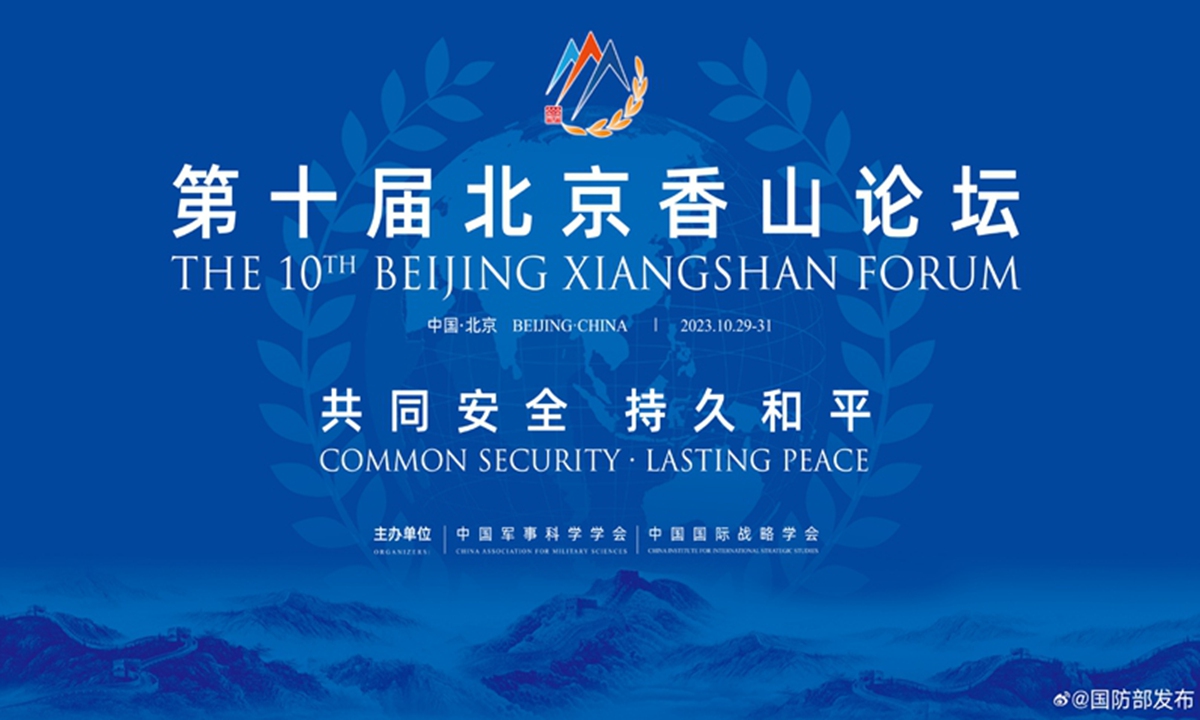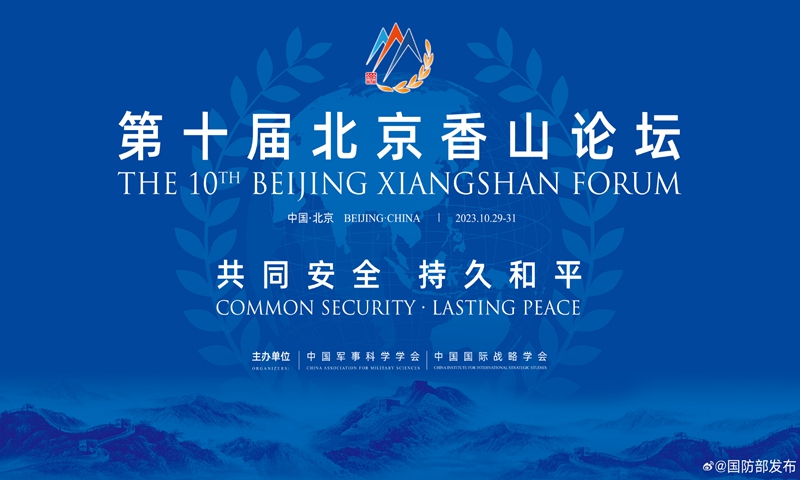
Photo: Screenshot from Sina Weibo of China's Ministry of National Defense
Editor's Note:"China has taken increasingly active approaches to addressing global and regional security challenges and risks," said Kim Chang-su (Kim), the advisor to the Korea Research Institute for National Strategy and former Senior Research Fellow at the Korea Institute for Defense Analyses. The 10th Beijing Xiangshan Forum started Sunday in Beijing. Once a forum participant, Kim shared his views on China's global security concept, his expectations for this year's forum as well as the Northeast Asian security and stability in an interview with Global Times (GT) reporter Li Aixin.
GT: You attended the Xiangshan Forum in 2015. What impressed you most about the forum, and what do you expect from this year's forum?
Kim: Relative to the IISS Shangri-la Dialogue and Manama Dialogue, the Munich Security Conference, the Brussels Forum and the Halifax International Security Forum, the Xiangshan Forum was a less-known and late-comer in the business of the track 1.5 dialogue. And yet, the Chinese PLA, the China Association for Military Science and China Institute of International Strategic Studies apparently made tremendous efforts to stage a forum befitting the name of a rising China.
The venue for the forum was the China National Convention Center which has advanced facilities with modern accommodating hotels, dwarfing other older, competing major forums and conferences. Along with the six official UN languages, over a dozen foreign languages were simultaneously translated. This simply outnumbered the languages translated at other forums and conferences. Another feature of the forum was multiple panel sessions including one on nuclear weapons and WMDs, where North Korean officials were in attendance.
GT: The theme for the Xiangshan Forum this year is "Common Security Lasting Peace," encouraging relevant parties to build trust, seek common ground, enhance communication and cooperation, and oppose confrontation. What's your comment on China's global security vision?
Kim:China's global security vision has been received as a reasonable response to the US Indo-Pacific Strategy and the Quad. In fact, China has taken increasingly active approaches to addressing global and regional security challenges and risks that it deems vital and significant to its national interests. I hope China can continue to provide solutions to traditional security issues such as war on terror and territorial disputes, emerging security challenges across the global, such as climate change, pandemic diseases, and stable supply chains.
GT: What do you expect from China's role in future global security governance?
Kim:China can and should take on the role of a more responsible stake-holder. Today China needs to engage in global security governance more actively and assuredly winning the status and prestige as a true global power.
GT: Recently, the relationship between China and South Korea has faced difficulties. Given some US-South Korea-Japan military cooperation and interactions, some observers say that an East Asian NATO is taking shape. What's your take on this?
Kim:Strengthening of the ROK-US alliance and trilateral security dialogue and cooperation among the ROK, US and Japan have encountered differing and often contradicting responses. For example, the deployment of a THAAD battery in Sangju, on a US military base, has sparked anger and a sense of betrayal among decision makers in Beijing and ordinary Chinese citizens, resulting in rising anti-Korean and anti-Chinese sentiments that have damaged our bilateral relations significantly.
NATO is a regional collective security mechanism that has expanded its membership to as many as 31 as of June this year. While Asia and Europe can't be compared squarely with their own languages, religions, histories, cultural heritages, they have become intertwined closely in their economy, trade, science and technology, and their responses to emerging global and regional security concerns. So, my answer to your question is negative. Washington, Tokyo and Seoul alike see no justifiable reasons to form a new NATO-type regional collective security mechanism for East Asia.
GT: What are your suggestions on how to resolve the challenges and difficulties in China-South Korea ties? In what ways can we unlock the potentials of the cooperation between China and South Korea?
Kim:We have to revisit some superficial lessons learned from recent clashes of our interests, perceptions, and responses at the government and popular levels. From the Chinese perspective, they include the THAAD deployment, the Indo-Pacific Strategy, the Washington Declaration, the activation of the US-ROK Nuclear Consultative Group, resulting in more frequent deployment of US strategic weapons, and combined military exercises and training.
From the South Korean perspective, they include the BRI, the SCO expansion, Beijing's policies on Hong Kong and Taiwan, Beijing's fence-sitting position on the Russia-Ukraine War and North Korea's launches of missiles and new weapons systems, and the growing security and military ties among China, Russia and North Korea. Many of these developments in our recent bilateral ties are understandable, to an extent. However, they have often been prone to misperceptions and biases exacerbated by opinions by some pundits and media editorials and commentaries, and then they are instantly widespread on social networking services.
GT: According to South Korea's Foreign Ministry, high-ranking diplomats from China, South Korea and Japan reached an agreement to work toward holding a trilateral summit at the "earliest convenient time." Why is it important to stabilize and improve ties among these three countries?
Kim:Our three Asian countries have many historic and cultural commonalities due largely to geographic proximity, but have positioned themselves as members of the G7 and G20. We have suffered from lingering memories of the Imperial Japanese aggressions, the Korean War and other Cold-War hostilities and military confrontations. We also have ever-widening gaps in our national power, economy, military, and science and engineering, however, we cannot leave from this region and should continue to tackle with various common security challenges. The importance of stabilizing and improving ties among our three countries lies in testing how effectively we can mitigate these common security challenges. One way of addressing these security issues is to restart a long overdue trilateral summit, upheld by foreign, defense and finance ministerial talks plus working-level talks, supported by the 10-year-old trilateral secretariat based in Seoul.

